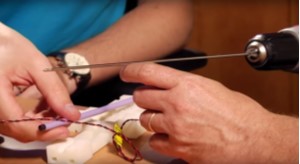
Providing a solution for the bending of guide wires during spinal fusions and surgeries for a fractured hip or pelvis, a multidisciplinary team from the Hadassah Medical Center and Hebrew University’s BioDesign Medical Innovation program has invented an opto-electronic system called BendGuide that enables the surgeon to correct the problem as it occurs.
These thin metallic guide wires are important for the proper positioning of the fixation screws, which hold the bone in a fixed position. BendGuide monitors and detects minute changes in the guide wire’s trajectory during surgery and alerts the surgeon, in real time, to any deflection (bending). This enables a surgeon to make changes in the trajectory before damage occurs, eliminating breakage and the need for time-consuming repair. As Prof. Meir Liebergall, head of Hadassah’s Orthopedics Department, explains: “Complication in guide-wire positioning can lead to revision surgeries and increased hospitalization time and cost.” To address this surgical challenge, Prof. Liebergall partnered with a BioDesign team, comprised of medical doctors and engineering and business students.
BioDesign Medical Innovation is a multi-disciplinary, team-based approach to medical innovation, created by Hadassah and the Hebrew University. Sponsored by Boston Scientific and the Terumo Medical Corporation, the program brings together outstanding medical fellows, along with bioengineering and business graduate students, and tutors them in the science and practice of taking a medical innovation to market. The program is headed by Prof. Yaakov Nahmias, Director of the Hebrew University’s Alexander Grass Center for Bioengineering, and Prof. Chaim Lotan, Director of Hadassah’s Heart Institute.
The innovations produced by the Biodesign program participants are commercialized by Hadasit, the technology transfer company of the Hadassah Medical Center, and Yissum, the technology transfer company of the Hebrew University.
